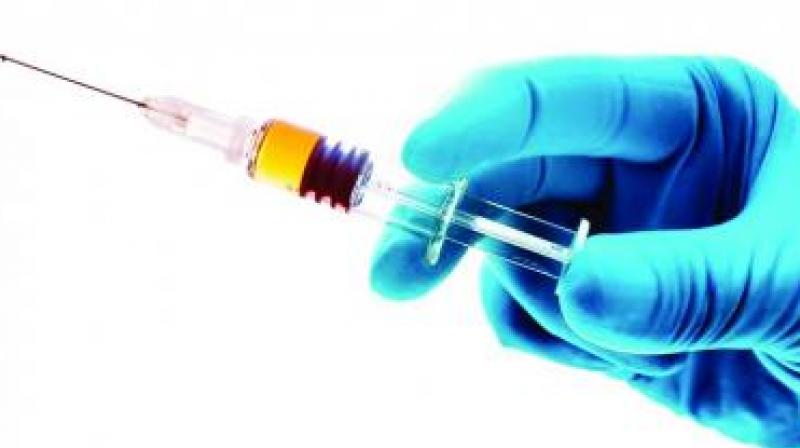Hepatitis vaccine coverage low in Karnataka
Hepatitis B vaccination is administered intramuscularly.

Bengaluru: Health officials are worried about the threat posed by Hepatitis B as the immunization coverage in the state continues to be poor.
According to National Family Health Survey (NFHS-4) data, only 58.9 per cent children aged between 12 and 23 months receive three doses of Hepatitis B vaccine in Karnataka.
Dr Ravindra B.S., a Senior Consultant and In-Charge, Department of Medical Gastroenterology at BGS Gleneagles Global Hospitals said, “The Hepatitis B vaccination is usually administered intramuscularly.”
The vaccine, he added, is very effective. “In healthy people, routine immunization results in more than 95 per cent of recipients being protected. If a child who has not been vaccinated contracts the virus; it can cause chronic infection and put them at high risk of death from cirrhosis or even liver cancer. It can even be fatal, if it isn’t treated,” he explained.
Private hospitals lag behind
A study conducted on Hepatitis B immunization done among new-borns in private and government hospitals in rural Karnataka found HPV vaccine coverage was low in private hospitals (43.35 per cent) as against 87.76 per cent in government hospitals. The NFHS-4 data also revealed that in urban areas, where most children were born in private hospitals, the vaccine coverage was 54.1 per cent to 62.8 per cent in rural areas.
“In most of the cases, the mothers don’t follow up the vaccination after delivery and some are ignorant. The department is now working on creating awareness about all kinds of vaccinations including Hepatitis B, especially in the rural areas of the state,” said official from the Health and Welfare Department.
How does it spread?
The research from the study also shows the inability to render vaccinations at birth leads to death of many who suffer from viral disease.
Dr Kiran Kumar, Consultant Pediatrician & Pediatric Intensivist said, “Hepatitis B infection gets transmitted easily to the foetus during pregnancy, so it is very important to immunize infants at birth. Unimmunized children are prone to chronic hepatitis and are at risk of hepatocellular carcinoma. The vaccine is usually given as 3 or 4 shots over a 6-month period. Infants should get their first dose of Hepatitis B vaccine at birth and will usually complete the series at 6 months of age.”
The World Health Organisation (WHO) statistics reveal that four crore people are chronically affected by Hepatitis B in India and 1, 15,000 people die due to complications.
Dr Ravindra also said that Hepatitis B spreads when people come in contact with the blood, open sores, or body fluids of someone who has the Hepatitis B virus. Fortunately, it can be treated by medications now.
Nevertheless, vaccination is the key. “In some cases, awareness is low and in other cases, immunization schedules are not taken seriously, potentially putting them at risk of contracting the virus in the future,” he added.

